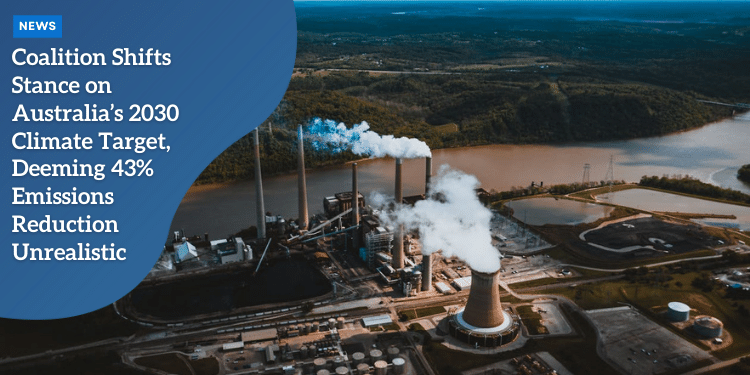Coalition Shifts Stance on Australia’s 2030 Climate Target, Deeming 43% Emissions Reduction Unrealistic

Anúncios
The federal Coalition has made a significant policy shift, announcing that it will abandon Australia’s commitment to reduce greenhouse gas emissions by 43% by 2030, a pledge initially made under the Paris Agreement.
This unexpected move asserts that such ambitious targets are unattainable within the given timeframe.
Consequently, this decision may have far-reaching implications, both domestically and internationally.
Australia’s Commitment Under the Paris Agreement
Australia, along with numerous other countries, committed to substantial emissions reductions under the Paris Agreement.
Anúncios
Specifically, it vowed to cut emissions by 43% from 2005 levels by the end of this decade.
However, the recent announcement by the Coalition raises questions about the country’s ability to meet these obligations moving forward.
Abandoning the Target: Implications and Arguments
By deciding to abandon the 43% emissions reduction target, the Coalition’s stance necessitates withdrawing from the Paris Agreement itself.
This decision has sparked a fierce debate about the potential repercussions.
The Coalition believes that the Labour government will fail to achieve the target and that attempts to meet it will severely harm Australian industries.
Anúncios
Shadow Energy Minister Ted O’Brien emphasized the perceived risks, stating, “The cost of achieving the 2030 targets set by Labour will be catastrophic. If Labour insists on this path, which industry will they sacrifice? Will it be manufacturing, agriculture, or resources? The only conceivable way for Labour to attain their 2030 target is to decimate industry. This is something the Coalition will not tolerate.”
Assessment by the Climate Change Authority
According to the latest projections from the Climate Change Authority, Australia may not be on track to meet the 2030 target.
Nevertheless, the Authority suggested that if the government enacts its promised policies, the country could potentially come very close to achieving its goal.
A significant portion of the emissions reduction effort is expected to be undertaken by the energy sector.
The government has committed to operating the national grid with 82% renewables by 2030.
The Coalition, however, maintains that this target is also unattainable.
As an alternative, it is preparing to unveil a radically different energy policy, one that will depend more heavily on gas and include the construction of nuclear power plants on the sites of retired coal-fired generators.
The Coalition’s New Energy Policy
Although the release of this new energy policy has been delayed repeatedly, some details have emerged.
The Coalition is focused on integrating nuclear energy into Australia’s power mix, arguing that nuclear power should play a pivotal role in attaining net zero emissions by 2050.
Shadow Energy Minister Ted O’Brien, when questioned about the possibility of adopting interim targets, was noncommittal, saying, “When it comes to our energy policy – that will be released in due course.
However, we refuse to accept Labour’s ongoing dishonesty in misleading Australians to believe everything is progressing smoothly.”
Potential Withdrawal from the Paris Agreement
The federal government’s response to the Coalition’s announcement has been one of heavy criticism, highlighting the potential risks to Australia’s international standing and the certainty required by industries operating in an already volatile environment.
Energy Minister Chris Bowen pointed out a critical aspect of the Paris Agreement, explaining, “The Paris Accord is unambiguous – you cannot backslide or reduce your commitments.
So, is [opposition leader] Peter Dutton proposing to lead Australia out of the Paris Agreement, or is he merely hoping it goes unnoticed?
Currently, the only countries outside the Paris Accord are Libya, Yemen, and Iran.
Does Mr. Dutton wish for Australia to join such a company?”
Opposition and Criticism from Climate Groups
Climate groups have also voiced strong opposition to the Coalition’s announcement.
They argue that Australia is making substantial progress towards meeting the 2030 target.
Drawing back from this commitment could not only undermine the hard-earned momentum but also set a dangerous precedent for future climate action.
Broader Implications for Australia’s Climate Policy
Abandoning the 43% emissions reduction target could have numerous adverse consequences.
For one, it would necessitate a withdrawal from the Paris Agreement, a move that could isolate Australia on the global stage.
Moreover, such a withdrawal may undermine international collaboration on climate change mitigation, a critical element in tackling a problem of this magnitude.
Domestically, there are concerns about the impact on renewable energy investments.
The uncertainty introduced by such policy reversals can deter investments in renewable energy projects and innovation.
Furthermore, the failure to commit to interim targets between now and 2050 leaves businesses and industries without clear direction, complicating their own planning and sustainability efforts.
The Path Forward: Achieving Net Zero by 2050
While the Coalition remains officially committed to achieving net zero emissions by 2050, its approach diverges significantly from Labour’s policies.
The push for nuclear energy marks a stark departure from Labour’s strategy, which heavily relies on renewable sources.
The construction of nuclear power plants is a long-term venture, often plagued by high costs, rigorous regulatory hurdles, and public opposition.
Thus, while nuclear power may contribute to the net zero goal in the long term, it does little to address the immediate targets set for 2030.
Securing a reliable and sustainable pathway to net zero will require a balanced mix of renewable and non-renewable energy sources.
This includes continued investment in wind, solar, and hydroelectric power, along with exploring new technologies such as hydrogen and carbon capture and storage (CCS).
Conclusion: Navigating the Challenges of Climate Policy
The Coalition’s shift in stance on Australia’s 2030 climate target underscores the complexities of crafting and implementing effective climate policy.
Balancing economic interests with environmental responsibilities is a delicate task that requires transparent and evidence-based decision-making.
As the debate continues, it is essential for both political leaders and the broader community to engage in open, informed discussions about the future of Australia’s climate strategy.
Moving forward, Australia’s approach to climate policy will likely serve as a case study for other nations grappling with similar challenges.
Whether through renewable energy, nuclear power, or a combination of both, the ultimate goal remains clear: ensuring a sustainable and prosperous future for all.






